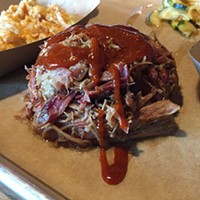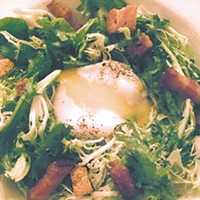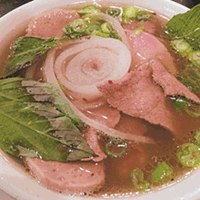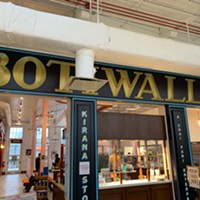In 2007, Charlotte was teetering on the edge of gaining national recognition for having a plethora of creative restaurants with talented chefs offering memorable and inventive dishes.
That was then. The culinary landscape has changed significantly in the past three years. Then, entrée prices were creeping into the high 20s, low 30s; and steak houses, which could not open fast enough, were commanding even higher prices. To be clear: Prices at chef-driven restaurants generally are dictated by the cost and quality of the ingredients as well as the cost associated with highly trained employees.
Real estate leasing agents across the city signed budding restaurateurs into long-term, high-cost-per-square-foot leases, giving -- if at all -- a small fraction of an upfit allowance. Everyone wanted to be in the game.
Charlotte was also experiencing a surge of recently trained chefs graduating from CPCC, the Art Institute, and Johnson & Wales University while established chefs moved into the area. North Carolina vineyards were being planted at an exponential rate. In 2005, North Carolina had about 50 vineyards. Today, the number is approaching 100. The new $5 million Shelton-Badgett North Carolina Center for Viticulture and Enology at Surry Community College is slated to open soon, and a baccalaureate degree in Wine Production and Management is now offered at Appalachian State University, also home of the Center for Mountain and Steep Slope Viticulture.
But with the onset of the 2008 recession, the economic environment of Charlotte changed dramatically. Bankers and salespeople who once used expense accounts at the high-end restaurants virtually disappeared in September 2008. Bonuses for banking employees also evaporated while layoffs flourished. The Mecklenburg unemployment rate was over 12 percent.
In July 2009, Mecklenburg's sales tax collections were $24.8 million, down 25 percent from 2008. People had reduced spending. Restaurants closed.
Then the already distressed industry was hit again when in August 2009, Mecklenburg County increased the prepared foods and beverage tax to 9.25 percent (this includes the state tax). This nearly 10 percent tax along with a tip can add 25 to 30 percent to a check.
Thus the paradox: Just as Charlotte gained the size and talent to support a varied pool of extraordinary restaurants, consumers were spending less.
Adapting to the situation, local restaurateurs staked a claim in the low-end burger, taco, pizza, sandwiches and barbecue concepts (which do not require high salaried chefs) while national franchises of these fast casual concepts opened just as quickly.
Farmer's BBQ is an example of this. Jay English, a 2002 culinary graduate of Johnson & Wales University in Rhode Island, had spent the early part of his career in hotel dining rooms before moving to Charlotte with a barbecue chain. English opened Farmer's BBQ in October 2009, which meant the planning for this concept was in the works when the economy collapsed. English notes, "You know what they say, when everything is down, the only way to go is up."
This fast casual concept features pork (Boston butt and ribs), chicken, and beef brisket barbecue and a variety of sauces including Eastern N.C., Lexington, mustard, sweet, and spicy. His barbecue is smoked over hickory wood in electric smokers. Also on the roster are chicken and tuna salad, smoked wings, corn bread and Brunswick stew. Check averages at lunch are $6 and $10 at dinner. A breakfast of two eggs, grits and Texas toast is $2.50. English has no servers: Farmer's is counter service only.
The concept has proven to be successful. In late 2010 to early 2011, two Farmer's BBQ franchises are planned for Rock Hill, S.C., and Mooresville. English says, "I was in the hotel restaurant business, which charged a lot of money for food which was not equal to that kind of price. This is a family-friendly place where people looking for good food at a reasonable price can come and not spend an arm and a leg." (Farmer's BBQ, 2700 W. Mallard Creek Church Road, 704-549-1007. Hours 7 a.m. until 9 p.m. Breakfast served until 11 a.m. www.farmersbbq.com.)
Nowadays, you'll find comfort emporiums such as Savor Café, The Crepe Cellar, The Liberty, Common House and Whiskey Warehouse. Meanwhile, chef-driven restaurants scramble to keep abreast of the new economic reality in Charlotte. Chef and owner Jim Noble, who is relocating his high-end Noble's later this summer, recently opened The King's Kitchen, a Southern comfort food spot downtown, and has a barbecue joint planned. Restaurateur J. D. Duncan, of Bonterra, replaced Las Ramblas, a Spanish tapas bar, with Sunset Grille, which features pizzas and burgers.
Tacos are hot. SouthPark now has three new TexMex places: San Antonio's Modern Mexican (CentraArchy Restaurant Company); Paco's Tacos & Tequila (a restaurant concept by local restaurateur Frank Scibelli); and Taco Mac (a chain from Atlanta, self-described as a neighborhood pub) in the Piedmont Town Center. 1900 Mexican Grill: Traditional Mexican Cuisine has been operating on Park Road for five years and opened its second shop on Elizabeth Avenue.
Where once Charlotte was overrun with steakhouses and sushi bars, now low-cost non-chef driven restaurants are dominating the market.
Know of a restaurant that has opened, closed, or should be reviewed? Does your restaurant or shop have news, menu changes, and new additions to staff or building, upcoming cuisine or wine events? To be included in our online blog, Eat My Charlotte, send information to Tricia via e-mail (no attachments, please): tricia.childress@creativeloafing.com.
Latest in Food & Drink Features
More by Tricia Childress
-

Seoul Food Meat Co's got soul
May 4, 2016 -

Aix en Provence flourishes in Myers Park
Apr 6, 2016 -

Pho and beyond at Saigon Bay Vietnamese Cuisine
Mar 2, 2016 - More »
Calendar
-

Aria Tuscan Grill Featuring Allegrini - Charlotte Wine + Food Week @ Aria Tuscan Grill
-

Angeline’s Featuring Sciandri Family Vineyards @ Angeline's
-

Charlotte Wine + Food Week Presented by Truist @ Charlotte, NC
-

Cakeable Cafe Grand Opening @ Cakeable Cafe
-

Haw River Wine Tasting @ Carolina Beer Temple.
-
Dorie Greenspan's Tiramisu Cake
This layered cake is definitely a "pick-me-up" with a little booze and caffeine.
-
Authentic New York-style Bagels Come to South End 1
Poppy's expands its empire
-
Eating With Your Dollars: The best fast food money can buy 14
The Food Babe talks juicing.











